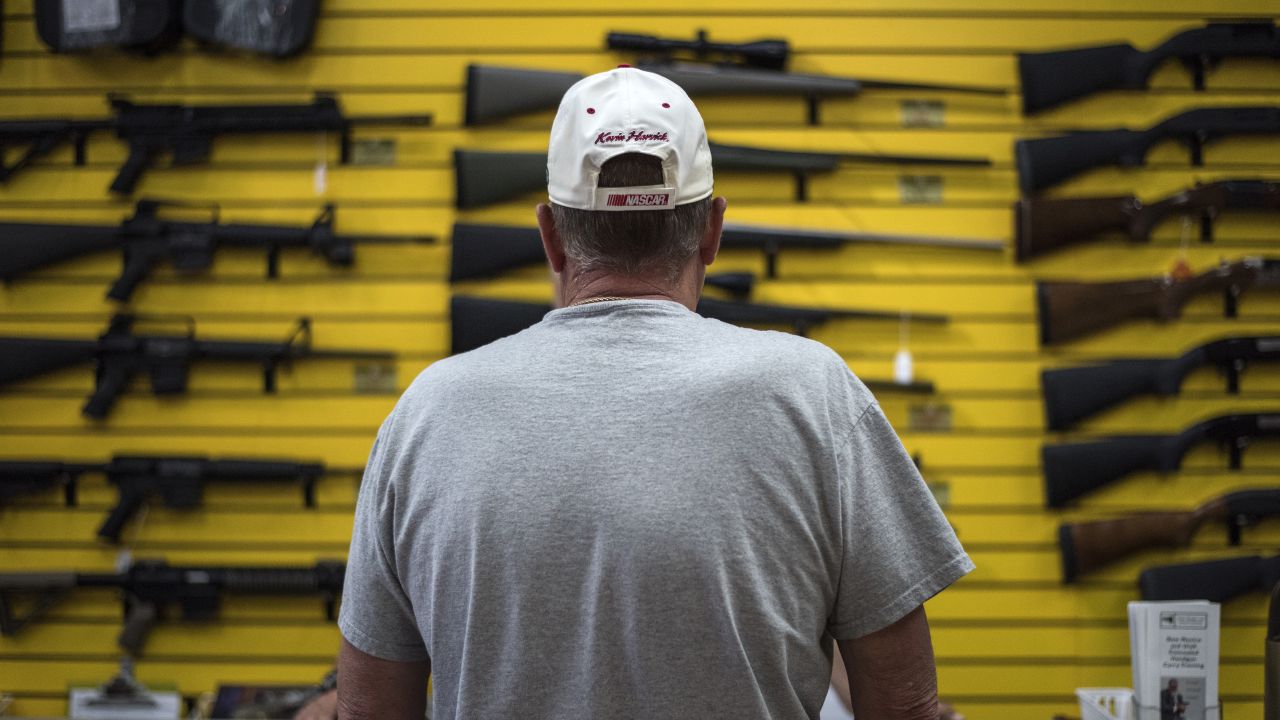
Statistics show the majority of gun owners support “commonsense” regulations of firearm sales, says public advocacy lawyer Dennis Henigan. (Photo by Sergio Flores/Bloomberg via Getty Images)
For two leaders of the long-stymied efforts to enact stricter gun control laws, the future looks at once hopeful and apocalyptic: A political breakthrough seems tantalizingly close, they say, but only if supporters up their game to overcome opposition that is behaving more like a cult than a political movement.
That is the strikingly similar message offered by Sen. Chris Murphy (D-CT), in a speech this week at the National Press Club, and veteran gun control lawyer Dennis Henigan, in a recent interview with BillMoyers.com.
The two men come to the issue from very different chronological places: Henigan, a bespectacled public interest lawyer whose hair is more salt than pepper, graduated from Oberlin College the same year Murphy was born, and spent 23 years at the Brady Campaign to Prevent Gun Violence, pioneering the use of civil lawsuits to make gun manufacturers and sellers accountable for gun violence. Murphy acknowledged he never thought much about gun violence and how to control it until the day, nearly four years ago, when a deranged young man armed with three high-power guns killed 26 people — most of them young children — at the Sandy Hook Elementary School in his home state just weeks before he was to be sworn in as one of its US senators.
But they have come to the same conclusions about the gun debate’s state of political play, the nature of the forces arrayed against them and what will be required to win.
On Thursday, Murphy — a Democrat who earlier this year filibustered for 15 hours to draw attention to Congress’ inaction in the face of mass shootings — painted a dark picture of a gun lobby systematically trying to undermine Americans’ faith in their laws and institutions to make the case for a massively armed society. Anti-gun-control activists are exploiting the “neo-anarchist bent of the Republican Party,” Murphy said, one that has “especially since the election of the first African-American president become especially hostile to government.”
He accused the National Rifle Association of fearmongering as a business strategy.
Because the percentage of Americans who own guns is on the decline, the gun industry is encouraging a smaller customer base to buy “larger caches of weaponry” with “a fantasy construct of a world in which civilians need to arm themselves against government,” he said.
And while his audience laughed at the visions of “black helicopters” Murphy conjured, the first-term senator pointed out that most Americans have been brought up to hero-worship the nation’s founders, who, in colonial times, “hated their government so much” they took up arms against it.
“Guns are in many ways at the core of American mythology,” Murphy said.
The mythology of guns is at the core of Henigan’s just-released book, “Guns Don’t Kill People, People Kill People” And Other Myths About Gun Control. After more than two decades of debating anti-gun-control advocates on behalf of the Brady Campaign, Henigan said, he wanted to systematically rebut a narrative he believes is both false and powerful.
“There’s a very coherent catechism of beliefs, and there’s an intensity about those beliefs that’s akin to the commitment of various people to their religious beliefs,” Henigan said. He painted the NRA as a sort of Frankenstein that has now become more powerful than the gun industry that underwrites it. After Smith & Wesson reached a landmark settlement on gun safety with President Bill Clinton’s administration in 2000, Henigan noted, the NRA encouraged a boycott of the gun manufacturer that nearly drove it into bankruptcy.
“The NRA derives its power not only from its funding,” Henigan said, “but also due to the intensity of its hard-core supporters.” And the NRA works hard to inculcate those supporters with what Henigan calls “the slippery slope” myth — which holds that any regulation on guns, even the most modest, is a first step toward confiscation of all of them. The NRA’s hold on its grass roots also keeps gunmakers who might be inclined to compromise on gun control in line, Henigan said: “They’re terrified of the NRA’s power over their own consumers.”
Politicians are terrified too. As a lobbyist for gun control measures, Henigan said he frequently encountered lawmakers who sympathized with his cause but told him, “All I hear is from constituents who think I vote for background checks; it’s the first step down a slippery slope toward taking away their hunting guns,” and who feared “they will never vote for me again, they will work against me.”
“The antidote to that,” Henigan said, “is more people contacting their legislators and saying, ‘If you continue to pander to the gun lobby, if you continue to oppose sensible reforms, we will work against you.'”
The “intensity gap” between the two sides of the gun control debate is one reason Henigan wrote his book. “I wanted to speak to those who support gun control laws and to convince them that this ought to be more important to them as an issue,” he said. Henigan says he believes the gun lobby’s myths have affected even the people who favor gun control. “There was a 15-year period where Democrats ran from the gun issue,” he said. Henigan would know: The groundbreaking legal practice he set up at Brady, suing gun sellers and manufacturers for civil damages on behalf of shooting victims, has been greatly curtailed by a 2005 law passed with Democratic support that gave legal immunity to the gun industry. “It has had a real chilling effect,” said Henigan.
In this year’s Democratic presidential nomination contest, the immunity law became an issue between Hillary Clinton, who opposed the measure, and Sen. Bernie Sanders, who had backed it. Sanders has since co-sponsored a bill that would repeal immunity for gun makers and sellers.
Both Henigan and Murphy cited Clinton’s decision to embrace gun control as a part of her presidential campaign as one of the signs of a sea change in the politics of gun control, along with the positive responses to both Murphy’s Senate filibuster and House Democrats’ sit-in for gun control over the summer.
Even Republicans who have backed — and been backed by — the NRA are putting some distance between themselves and the group, said Murphy. He cited a pointed comment Sen. Lindsey Graham (R-SC) directed toward his “friends in the NRA” after Murphy’s Senate filibuster, noting that “every right has boundaries,” and the spotlight Sen. Pat Toomey (R-PA) is putting on his independence from the NRA during his campaign for re-election this year in a state of hunters.
Murphy said he plans to campaign across the country in states where gun control initiatives are on the ballot and where there are clear differences between congressional candidates on the issue. Since the December day he had to cancel a trip with his own children to see the Rockefeller Center Christmas tree so he could rush to the scene of the Sandy Hook massacre, enacting gun control has become the “singular focus” of his career, Murphy said.
“Sometimes you choose the issue,” he added. “Sometimes, the issue chooses you.”



